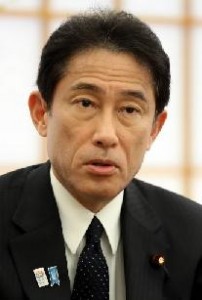Interview with Fumio Kishida, Japanese foreign minister, on fruits of non-nuclear diplomacy
Apr. 19, 2013
by Junpei Fujimura, Staff Writer
Foreign Minister Fumio Kishida, who was elected from Hiroshima’s first constituency, visited the Netherlands and the United Kingdom through April 12 and took part in two ministerial meetings. These were the first top-level meetings in which Mr. Kishida was expected to lead non-nuclear diplomacy as a foreign minister elected from the A-bombed city. The Chugoku Shimbun interviewed Mr. Kishida about the results of the meetings and his future tasks.
You took part in the ministerial meeting of the Non-proliferation and Disarmament Initiative (NPDI), composed of ten nations, and the meeting of the Group of Eight (G8) foreign ministers. Did you feel a positive response?
Next spring, the NPDI foreign ministers’ conference will be held in the city of Hiroshima. There was a positive response when I said that this would be an opportunity for the participants to learn about the reality of the atomic bombing firsthand. At the G8 meeting, I stressed Japan’s serious posture toward nuclear arms reduction and non-proliferation and I encouraged the other member nations to include the importance of advancing toward a world without nuclear weapons in the statement we issued.
You also announced your idea for the new program “Youth Special Communicators for a World without Nuclear Weapons” at the NPDI ministerial meeting.
A-bomb survivors have been serving as “Special Communicators for a World without Nuclear Weapons,” but they are growing older and their average age is now over 78. The role of sharing the survivors’ experiences must be passed down to younger generations. I was pleased that the participants expressed support for my idea.
How will you translate this idea into a tangible program? When will it begin?
I plan to send young people to events like international conferences, inside and outside Japan, and have them relate the horrors of the consequences of nuclear weapons. Preparations for the program will be made swiftly so that it can be launched while people’s interest in the idea is still high. The participants at the next meeting in Hiroshima will see that we have made steady progress in bringing the program to life.
What role should be played by Japan, which suffered the atomic bombings?
There is always an immediate reaction when I tell people that I’m from Hiroshima. Hiroshima is well known, and at the same time, this fact means that people hold high expectations for Hiroshima to exercise leadership in discussions to advance a world without nuclear weapons. I feel the weight of my responsibility.
I have been trying to make it known that I am a native of Hiroshima. My task is to get others to understand the points I’m making, deepen our discussions, and produce tangible results. I hope to do these things in a steady and realistic manner.
(Originally published on April 17, 2013)
Foreign Minister Fumio Kishida, who was elected from Hiroshima’s first constituency, visited the Netherlands and the United Kingdom through April 12 and took part in two ministerial meetings. These were the first top-level meetings in which Mr. Kishida was expected to lead non-nuclear diplomacy as a foreign minister elected from the A-bombed city. The Chugoku Shimbun interviewed Mr. Kishida about the results of the meetings and his future tasks.
You took part in the ministerial meeting of the Non-proliferation and Disarmament Initiative (NPDI), composed of ten nations, and the meeting of the Group of Eight (G8) foreign ministers. Did you feel a positive response?
Next spring, the NPDI foreign ministers’ conference will be held in the city of Hiroshima. There was a positive response when I said that this would be an opportunity for the participants to learn about the reality of the atomic bombing firsthand. At the G8 meeting, I stressed Japan’s serious posture toward nuclear arms reduction and non-proliferation and I encouraged the other member nations to include the importance of advancing toward a world without nuclear weapons in the statement we issued.
You also announced your idea for the new program “Youth Special Communicators for a World without Nuclear Weapons” at the NPDI ministerial meeting.
A-bomb survivors have been serving as “Special Communicators for a World without Nuclear Weapons,” but they are growing older and their average age is now over 78. The role of sharing the survivors’ experiences must be passed down to younger generations. I was pleased that the participants expressed support for my idea.
How will you translate this idea into a tangible program? When will it begin?
I plan to send young people to events like international conferences, inside and outside Japan, and have them relate the horrors of the consequences of nuclear weapons. Preparations for the program will be made swiftly so that it can be launched while people’s interest in the idea is still high. The participants at the next meeting in Hiroshima will see that we have made steady progress in bringing the program to life.
What role should be played by Japan, which suffered the atomic bombings?
There is always an immediate reaction when I tell people that I’m from Hiroshima. Hiroshima is well known, and at the same time, this fact means that people hold high expectations for Hiroshima to exercise leadership in discussions to advance a world without nuclear weapons. I feel the weight of my responsibility.
I have been trying to make it known that I am a native of Hiroshima. My task is to get others to understand the points I’m making, deepen our discussions, and produce tangible results. I hope to do these things in a steady and realistic manner.
(Originally published on April 17, 2013)








